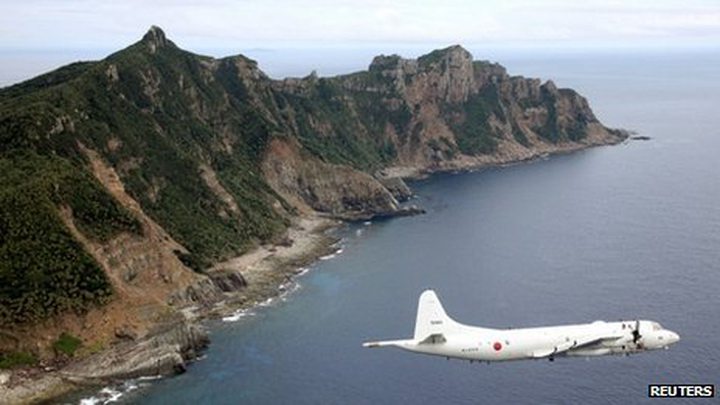Analysis: Risk of Conflict in East China Sea

US Defence Secretary Chuck Hagel described the move as "a destabilising attempt to alter the status quo in the region".
And on Saturday, almost as if to underline the risks involved, the Japanese authorities say that they scrambled two F-15 fighters to intercept two Chinese surveillance planes that were approaching the islands.
China's more assertive policy and Japan's apparent willingness to push back against it raises the possibility of sparking a wider conflict, albeit by accident perhaps, rather than by design.
All of the necessary points of friction are there. Last January, Japan insisted that a Chinese frigate locked its targeting radar on to a Japanese warship near the disputed islands. China denied it.

In the year ending last March, Japan scrambled aircraft to intercept what it regards as Chinese intruders a record number of times. And both China and Japan have mounted exercises that encompass the seizure or the defence of remote islands.
Having sought to draw lines at sea, Beijing is now seeking to draw lines in the air.
The upshot could be greater instability, with the ever-present danger that an incident between warships or aircraft could precipitate a localised conflict between China and Japan.
The consequences of such an encounter risk an escalation that could ultimately draw in other powers.
'Trump card'
While China is pursuing the rapid modernisation of its air and naval forces, in any localised conflict it might be at a disadvantage compared to the modern and probably more capable Japanese.
But drawing up a military balance between Japan and China is not really the issue here. The real question is how might such a crisis be managed? How might it be contained? Indeed is containment actually possible?
For there is a growing concern that the traditional tools of crisis management may be less useful than in the past.
Earlier this month a wargame was held at the US think tank, the Centre for Strategic and International Studies, acting out just such a scenario involving China and Japan.
It focused on how the US might respond to such a crisis. As matters got increasingly fraught between China and Japan the players acting out the roles of senior US officials resisted the deployment of US military muscle for fear of worsening the drama.
But then the Chinese actors in the wargame escalated significantly. Long-range Chinese anti-shipping missile units were moved to high-alert. Forces were despatched towards the islands in contention. The US was forced to act; the recommendation was made to send two aircraft carrier strike groups to the East China Sea.
At this point the wargame apparently ended; the US having played its trump card, and with the heavyweights of US naval power on the way the assumption was that the crisis would die down.
But one US strategic expert who follows events in this region closely - Robert Haddick - has warned that such assumptions may be outdated.
In the past, he notes, the despatch of a US carrier battle group was seen as the escalatory trump card, because there was very little that potential adversaries could do against them.
Antidote
However, China's growing area-denial or access-denial strategy seeks explicitly to put such US assets in jeopardy. Long-range anti-ship ballistic missiles are intended specifically to take out US carriers.
Escalating by despatching a carrier or two might in future not calm a crisis, warns Mr Haddick. It could actually encourage the Chinese to strike out against them.
The growing tensions between China and Japan are just one aspect of the wider strains in the region, which both Chinese and US strategy may actually be making worse.
One antidote is for better understanding between the US and Chinese militaries and there has been some recent progress here.
But in a broad sense the whole US strategic doctrine in the region - dubbed Air-Sea Battle - seems designed to contain China's rising military might, while China's area-denial strategy seems intent on hampering the ability of US air and naval forces to make significant interventions in waters that it regards as its strategic backyard.
This is why an unwanted Sino-Japanese clash puts so many experts' teeth on edge.





